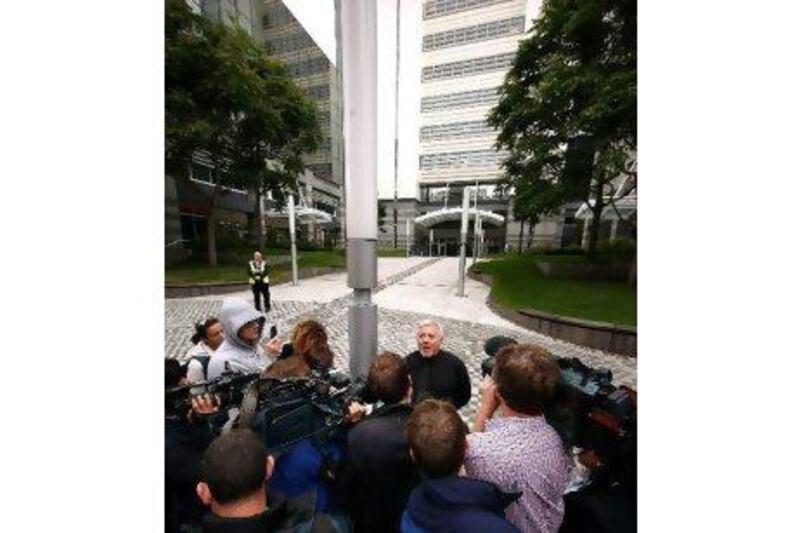In its heyday a half-century ago, it was known as "the barmaid's bible" because of its sex, crime and celebrity scoops that obliged more than six-million people to buy it every Sunday.
Even now, the News of the World remains the best selling English-language newspaper on the planet.
But not for much longer. After today's edition, it will disappear - a sacrifice on the altar of moral indignation brought about by the newspaper's phone-hacking antics.
The announcement late on Thursday stunned everyone, not least the 200 staff on a newspaper that has been part of British life for over 150 years. In the 1930s Churchill wrote for it and, later, The Beatles, Jam and The Smiths sung about it.
But everyone knew that something had to go to placate the public's mounting anger over the hacking scandal. Most people thought that it would be Rebekah Brooks, the former editor and now the chief executive of News International, the UK publishing arm of Rupert Murdoch's News Corp.
Even prime minister David Cameron has said he thought she should go - and she is a close friend of his - because she was editing the tabloid in 2002 when the phone of Milly Dowler had been hacked after the 13-year-old disappeared on her way home from school on the outskirts of London.
Milly was murdered but her body was not discovered for six months. It was during this period that the newspaper hacked her phone, deleting some messages, thus giving her parents hope she might still be alive and throwing confusion into the police investigation.
When these facts were disclosed by The Guardian last Tuesday, the phone-hacking saga, which had been rumbling on for five years, was elevated to a whole new level. Joe Public was unspeakably outraged: this was no longer about rich footballers, movie stars and politicians having their voicemails tapped - this was an ordinary family whose lives had been torn apart.
So Rebekah Brooks, who has been accused of lying about her knowledge of the phone intercepts, had to go. Or so everyone thought. But, instead, it is the paper itself that is going.
"The closure of the paper is all to save Rebekah Brooks," said Chris Bryant, a Labour MP who has led a parliamentary campaign to expose the extent of the hacking.
"They are trying to draw a line under this. It is inconceivable for her to stay now and, if she had a shred of decency, she would have resigned by now. These things happened on her watch."
But Mrs Brooks has powerful allies, not least Rupert Murdoch and his son James, who heads up News Corp operations in Europe and Asia.
James Murdoch told Sky News that he was satisfied that Mrs Brooks was not involved in and had no knowledge of the hacking. "It's her leadership that has gotten to grips with this whole period in the company's history," he added. "Her leadership is actually crucial right now. It's actually her moving a lot of this forward."
Yet it would be simplistic to assume that the shock closure of a newspaper still read by almost 7.5 million people every Sunday was the product of Rupert Murdoch's desire to save the career of one executive.
There were pressing commercial reasons why the News of the World had to go. Major advertisers were pulling out in droves and the row was - and still is - threatening the bid by Mr Murdoch's News Corp to gain complete control of BSkyB, the satellite broadcaster and biggest advertising revenue-generator in Britain.
When Ken Clarke, Britain's justice secretary, heard that the newspaper was to close, he smiled and told the BBC: "All they're going to do is relaunch it."
And that does, indeed, appear to be on the cards with the best bet being that a Sunday version of The Sun, News International's best-selling daily newspaper, will appear within a few weeks.
Media pundits agree that Mr Murdoch is unlikely to leave the lucrative Sunday tabloid market without one of his titles for long.
Additionally, Nick Robinson, political editor of the BBC, has pointed out that Mr Murdoch has expanding television interests in mind. "My guess is that the Murdochs have sacrificed the News of the World in order to salvage their television ambitions," he said.
"They want to expand in Germany, Italy, India and, of course, here in Britain, too."
The problem is where this story might go next. Questions have already been raised not just about Mrs Brooks but about James Murdoch's role as head of an organisation that was not only paying £100,000 (Dh589,700) a year to a private investigator to tap phones, but was writing off similar amounts in bribes to policemen for scoops.
Even prime minister Cameron appeared to have James Murdoch in mind when he said on Friday that police should question anyone "no matter how high or low" who may have been involved in the scandal.
A wider question is where this leaves the British press as a whole, particularly if, further down the line, other newspapers are implicated in phone tapping, even if not to the extent of the 'hackoholics' on the News of the World.
"The problem is that a witch-hunt mentality is developing," said a former, senior executive on the Daily Mirror. "Britain still has some of the best, most diverse newspapers in the world. And some of the best, most dedicated reporters.
"A fear must be that Cameron's inquiry into the practices and ethics of the press will not only lead to a curbing of excesses, but also might harm the vibrant, inquiring reporting of which we're justifiably proud."





